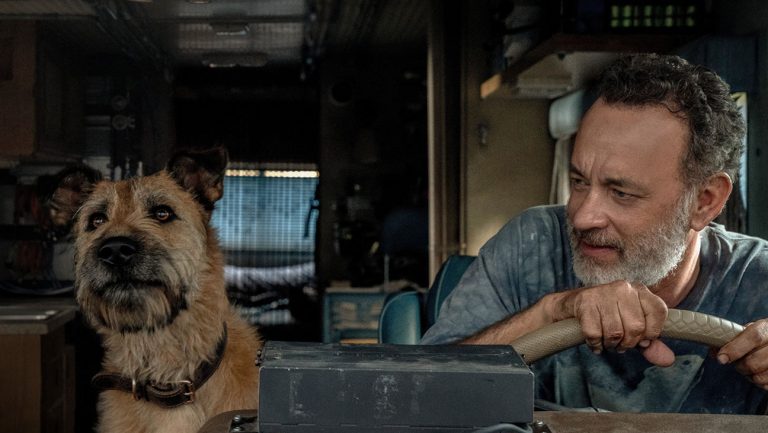Directed by Sasha Rainbow, Grafted (2024) is a gripping exploration of ambition gone awry and the dangerous pursuit of perfection. At its heart, the film follows Wei, a brilliant yet ethically compromised scientist whose revolutionary tissue-regeneration formula sends her life into a downward spiral. As she becomes consumed by her creation, betrayal, and murder pave her path, each act fueled by an unrelenting desire to erase her flaws—both physical and emotional. But as she reshapes herself, the narrative unravels the harrowing consequences of defying nature and fate. What becomes of her? Let’s dive in.
Spoilers Ahead
Grafted (2024) Plot Summary & Movie Synopsis:
What Happens to Wei’s Father?
Wei’s father, once a dedicated scientist, meets a tragic end due to his obsession with “fixing” the facial scar he and Wei share. He believes the scar is more than a physical flaw—viewing it as an ancestral curse—and devotes his life to finding a cure. His determination stems from guilt and a desire to free Wei from the emotional burden she carries.
His experiments initially seem promising, with regenerative cells showing progress. However, his success quickly spirals into horror as the regeneration accelerates uncontrollably. The skin begins to grow over his mouth, cutting off his ability to breathe. This horrifying transformation reflects the dangers of tampering with nature, as his well-meaning attempt to heal becomes a grotesque affliction.
Wei, desperate to save her father, takes a drastic step. She stabs him in the face to create a slit for him to breathe. This act, driven by fear and love, tragically fails to help. Instead, it underscores the futility of his relentless pursuit of perfection. Ultimately, his life ends in despair, a stark reminder of the unintended consequences of pushing scientific boundaries without caution.
Why Is Angela Not Comfortable with Wei?
After a few years, Wei moves to New Zealand to her cousin Angela’s house for higher studies. Angela values her place among the popular crowd, including her friend Eve. These friends openly disapprove of Wei, ridiculing her for her scar and socially awkward demeanor. Angela worries that associating with Wei might damage her social standing and her hesitation to invite friends over reflects her fear of losing their approval.
Angela’s discomfort also stems from their contrasting cultural attitudes. Having spent her life abroad, Angela has distanced herself from her Chinese roots to fit into Western culture. In contrast, Wei openly embraces her heritage. She displays her pride through a prayer altar honoring her late father. This difference makes Angela conscious of her own choices and adds to the unease she feels when Wei’s behavior draws attention.
Wei’s low self-esteem and awkwardness create further barriers between the two. While Wei hopes for a connection, her envy of Angela’s social ease and Angela’s indifference make it hard for them to bond. Angela likely senses Wei’s discomfort. But instead of addressing it, she avoids engaging with her, deepening the emotional divide.
Angela is fed up with her mother and father not being present in her life. When she was alone in the room, she had no one to put her frustrations over. But now, she has Wei. Her unfriendliness with Wei is nothing personal but her unsolved childhood issues. Angela’s actions reflect a struggle to balance her desire for acceptance with her discomfort over Wei’s presence. Her unease stems not from malice but from an inability to reconcile her insecurities and societal expectations, leaving their relationship strained.
What Does Wei Do to Angela?
Wei gets herself enlisted as a lab assistant to Professor Paul. During her time in the lab, Paul discovers that his thesis is rejected and he will not be getting any funding. So, he decides to let Wei work on her father’s work and he plans to steal it at the right time. However, the experiments failed along the way until one day Wei finally got the idea to put the corpse flower into the mix for the solution. While Paul is making out in his office with one of the students named Eve, Wei tests with corpse flower and finally, she has cracked the code. She made the medicine that would remove the marks on her face.

Later that night, Wei discovers that Angela has destroyed the altar dedicated to her father, an act that deeply offends her. This destruction is the final straw after Angela’s consistent rejection and an earlier accusation of an affair with Professor Paul. Angela’s refusal to hear Wei’s side heightens Wei’s frustration and fuels her rage. The tension culminates in a physical altercation, during which Wei, in a fit of fury, stabs Angela in the eye, leading to Angela’s death.
Faced with Angela’s lifeless body and the impending return of Aunt Ling, Wei’s survival instincts take over. She decides to use the experimental skin-grafting solution to erase her scar and assume Angela’s identity. In a grotesque act, Wei removes Angela’s face, applies the solution, and replaces her skin with Angela’s. This horrifying decision reflects Wei’s desperation to escape her social rejection, insecurities, and the stigma tied to her scar.
Wei’s attempt to live as Angela is initially successful, but her illusion quickly unravels. The grafted skin begins to deteriorate, symbolizing the unsustainable nature of her actions. Her decision to “become” Angela stems from years of feeling inadequate and ostracized, but it ultimately showcases the devastating consequences of unresolved trauma and unchecked obsession.
Why Does Wei Kill Both Eve and Jasmine?
Wei’s decision to kill Eve is driven by a mix of personal envy, revenge, and survival. Eve represents everything Wei yearns for—a life of beauty, popularity, and ease. Wei sees in Eve not only a perfect disguise but also an opportunity to retrieve her father’s missing notebook from Professor Paul. Wei lures Eve to her house under the guise of Angela and exploits Eve’s panic when she discovers the truth. Eve, unable to escape, becomes the next victim of Wei’s twisted survival instinct. The act of flaying Eve’s face and assuming her identity is more than a strategic move. It reflects Wei’s deep-seated resentment and desire to escape her own flawed existence by living someone else’s allegedly perfect life.
Unlike Eve, Jasmine’s death is not premeditated. Jasmine stumbles upon Eve’s decapitated head in Wei’s fridge, leaving Wei no choice but to silence her. Jasmine’s death is a result of Wei’s spiraling descent into desperation and guilt. Though Wei does not want to harm Jasmine, she prioritizes self-preservation over morality.
Wei’s killings are not only survival tactics but also manifestations of her internal struggles. Her envy, rejection, and obsession with perfection push her into moral oblivion. While the experimental liquid may have intensified her impulsive actions, Wei’s choices reveal that her trauma and societal rejection planted the seeds for her destructive behavior long before.
Grafted (2024) Movie Ending Explained:
Is Professor Paul Dead or Alive?
Professor Paul is technically alive, but his condition is worse than death. After breaking into Wei’s home to confront her about the stolen vial and Eve’s disappearance, Paul underestimates Wei’s capability for violence. Wei sedates him and, in a twisted act of vengeance, flays his neck and chest. She then uses his version of the regenerative solution to recreate the horrific fate her father suffered.
Wei’s actions toward Paul stem from a mix of revenge, desperation, and her distorted sense of justice. Paul’s arrogance and intent to take credit for her father’s work infuriate Wei. Her attack on him is not just personal; it is symbolic. By using the flawed solution Paul created, Wei ensures he suffers the same torment as her father—a poetic retribution for his greed and exploitation.

Paul’s survival is cruelly ensured by Wei, who places a straw strategically to keep him from suffocating. This act highlights Wei’s complete loss of morality. She derives satisfaction from reducing Paul to a helpless, grotesque state. Though alive, Paul’s life is a living nightmare. With his eyes and mouth sealed by regenerated skin, his condition mirrors Wei’s father’s tragic end, leaving him in constant suffering. While Paul is not physically dead, his existence is stripped of any quality or dignity. Wei’s actions reflect her complete descent into madness and her need to assert control in a world that once rejected her.
Does Wei Fall Victim to Her Own Creation?
In a desperate attempt to escape the police after Sheryl’s report, she turns to a homeless man who had once shown her kindness. However, the breaking of the vial containing the regenerative solution seals her fate. The liquid reacts with their skin, fusing Wei and the man into a grotesque mass—a horrifying manifestation of her relentless obsession with perfection.
Wei’s desire to erase her scars and become beautiful drives her to manipulate, kill, and experiment recklessly. Her lack of foresight and growing madness blind her to the unintended consequences of her actions. The regenerative liquid, initially her ticket to a new life, becomes the agent of her destruction. The fusion of her body with the homeless man is not only physically grotesque but also symbolically represents her moral decay and loss of humanity.
Wei’s transformation into a monstrous being underscores the irony of her journey. In pursuing societal acceptance and external beauty, she becomes the embodiment of her worst fears—a literal monster. Her obsession leads to the destruction of her identity, her sanity, and even the life of an innocent man who only wants to help her. Wei’s story serves as a cautionary tale of the dangers of unchecked ambition and obsession. While she avoids legal punishment, the cruel twist of fate that ensures her suffering is far worse. The solution she once believed would liberate her ultimately imprisons her into a nightmarish existence.
Is the Homeless Man Related to Wei?
The homeless man is not explicitly related to Wei in terms of family or shared involvement in the Corpse Flower experiments. However, his presence in the story carries symbolic weight. He represents acceptance of one’s flaws, as he bears visible scars but shows no sign of shame or desire to change them. Unlike Wei, who becomes obsessed with altering her destiny, the homeless man embodies contentment with natural imperfections.
Wei seeks his help out of desperation when she is on the run, but their interaction highlights their contrasting approaches to life. The abstract possibility of his connection to the experiments may be a thematic nod to destiny and its immutability. The film suggests that meddling with natural occurrences—whether through science or ambition—leads to devastating consequences. In the end, Wei’s obsession destroys both herself and the homeless man. Her inability to accept her flaws results in her darkened self, becoming a monstrous reality, dragging him down as collateral damage.






